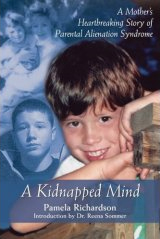Brainwashing in Custody Cases: The Parental Alienation Syndrome
AUSTRALIAN FAMILY LAWYER, v. 4(3), 1989, p.1, by Kenneth Byrne
Introduction
Divorce is one of the most stressful experiences that most people in our culture will experience in a lifetime. It is often accompanied by strong feelings of bitterness, betrayal, anger and distrust of the former partner. Each party often feels that they are "right" in many of their views on issues about which the couple disagree. When they have children the picture becomes infinitely more complicated. Among many other reactions, there is often a tendency for each partner to want the support or agreement of the child (or children) on critical issues. The more difficulty and intensity of negative feeling between the two adults, the more likely is this to be the case.
In some cases, the desire to have the agreement of the child can become strong enough to verge into brainwashing. By brainwashing I mean an effort on one parent's part to get the child to give up his or her own positive perceptions of the other parent and change them to agree with negative views of the influencing parent. At this intensity the motivation of the parent goes beyond simply getting the agreement and support of the children. Commonly, brainwashing parents are motivated by an opportunity to wreak a powerful form of revenge on the other parent -diminishing the affections of the children.
Typical examples include mentioning obvious weaknesses of the other parent and blaming those as the major source of difficulty between the parents. Nothing is said about the other parent's positive traits. The fact that both parents have contributed to the problem is also omitted.
This kind of communication has at least two psychologically destructive effects. First, it puts the child squarely in the middle of a contest of loyalty, a contest which cannot possibly be won. The child is asked to choose who is the preferred parent. No matter what choice, the child is very likely to end up feeling painfully guilty and confused. This is because in the overwhelming majority of cases, what the child wants and needs is to continue a relationship with each parent, as independent as possible from their own conflicts.
Second, the child is required to make a shift in assessing reality. One parent is presented as being totally to blame for all problems, and as someone who is devoid of any positive characteristics. Both of these assertions represent one parent's distortions of reality. It is as if the child walks outside on a sunny day in summer clothes, and feels quite comfortable. Then one parent says, "Billy, it's raining right now, and it's cold. You have to wear a raincoat and jumper". To appease that parent. the child must act in accordance with that statement, and bend his own perceptions of reality.
Some may argue that such behaviour is simply accommodating to the directions of a parent, something that children have to do all the time. However, in healthy interactions, the child is encouraged to accept a view of reality that is both accurate and adaptive. ("I know you don't want to study, but unless you do you might very well fail the test.")
Adults in the midst of a divorce are not famous for their objectivity, especially regarding their spouse. Typically, over weeks, months and years, the child is exposed to a long series of such distortions. In many cases, directly opposite information is being presented by the other parent. Children caught in this cross-fire inevitably end up with a significant degree of psychological disturbance, not the least of which is a distortion in basic reality testing about the world around them.
In divorces where the parents are unable to find any way to mediate the questions of custody and access, they typically turn to the legal system. In most cases, each seeks the advice of their own solicitor, setting in motion a legal duel. One of the effects of this duel is that each parent senses the need for a list of "horror stories" about the other. The intuitive feeling is that if it can be shown that the other parent is "worse" through a longer and more vivid list of horror stories, then "victory" in the form of physical custody (or greater access in some cases) will be won.
The Parental Alienation Syndrome
In cases of contested custody and access, mental health professionals have been seeing with increasing frequency an extreme form of brainwashing which has been called The Parental Alienation Syndrome (originally described by Dr. Richard Gardner, "Recent Developments in Child Custody Litigation", The Academy Forum Vol. 29 No. 2: The American Academy of Psychoanalysis, 1985). Children who are suffering with this situation have been subjected to an intense and persistent form of brainwashing by one parent against the other. The overt goal is almost always - at a minimum - to dramatically reduce contact by the child with that other parent. Commonly, the goal becomes to virtually eliminate the other parent from the child's life.
Example: Mrs. Litigious complained to her solicitor that her two children, aged five and eight, kept refusing to see their father on access visits, and that with each passing week, they became more tearful and resistant as the visit approached. She wondered whether the mid-week visit couldn't be reduced to every second or third week, or eliminated altogether, in order "to spare the kids all this pressure".
Mrs. Litigious had been married to her first husband, Mr. Cross, for ten years. She divorced four years ago, and is now remarried to Mr. Litigious. The solicitor asked for consultation from a forensic psychologist, Dr. Neutral.
Mr. Cross, father of both children, complained to his solicitor that his former wife was making it increasingly difficult to see his children. It started with him being kept waiting for increasingly longer periods of time when he would pick them up. Recently they had been pouting and saying he was "mean", with the younger echoing the older's complaints. On weekend visits this would last through Friday night and Saturday morning. By lunch time, both children began to seem happier, and the rest of the visit would go fine, until the drive back to mum's house. At this point the kids would again begin to disparage the father, saying for example, "We don't really like you - we only pretended to have a good time".
During his first visit with Dr. Neutral, Joe Cross, aged 8, said that he disliked his father very much, and did not want to seek him as often. When questioned about his reasons for this, he said "He hits me and doesn't let me watch television". The youngster could say nothing positive about his father, yet found a wide variety of praises for mum, with virtually no complaints about her.
Lisa Cross, age 5, virtually echoed her brother's words. Her reasons for not wanting to see her father were that "When I go there he just sits around and he makes me cook dinner!" She too could find nothing positive about father, and had no complaints at all about mother.
In a joint visit with father and the two children, Joe's complaints were aired. Mr. Cross readily acknowledged that what his son had said was correct, but put it in further context. He limited television to two hours, and made Joe stop when that time was up. On a recent Saturday morning, Joe had balked at this limit, an argument developed, and father slapped him once on the bottom.
In individual visits it soon became clear that Mrs. Litigious despised her former husband. Since the initial separation there had been a continuing feud, with bitter accusations on both sides. She argued strongly that whilst she encouraged and even forced her children to accept access visits, it was they who were now reluctant and unwilling. Her proposed solution was less access time. Her husband, when seen alone, echoed her bitterness. In his opinion it would be better for the children to never see their father, since he had no positive virtues whatever.
Psychological evaluation of Mr. Cross indicated that he was an argumentative and rigid man, who many would see as being somewhat difficult to deal with. He was also seen as a quite adequate father, who offered his children a good deal of love and support, and who was deeply attached to them.
Evaluation of Mrs. Cross found her to be a devoted and competent mother, but a rather immature woman, prone to let her emotions override her judgement.
In a report tendered to the court and to all parties, Dr. Neutral made the diagnosis of Parental Alienation Syndrome, and made specific recommendations for resolution of the matter.
This case illustrates all of the diagnostic symptoms of this disorder in its fully developed form. These symptoms are:
- The child shows a complete lack of ambivalence one parent is described almost entirely negatively, the other almost entirely positively;
- The reasons given for the dislike of one parent may appear to be justified, but investigation shows them to be flimsy and exaggerated; with younger children, the reasoning is even more transparent;
- The child proffers the opinion of wanting less contact with one parent in a way which requires little or no prompting. The complaints have a quality of being rehearsed or practised;
- The child seems to show little or no concern for the feelings of the parent being complained about;
- The alienating parent, while seemingly acting in the best interests of the children, is actually working to destroy the relationship between them and the other parent. It is not uncommon for this to be further fuelled by new spouses or de factos;
- Most importantly, while the children will verbally denigrate one parent, they retain an unspoken closeness and affection for that parent. However, if the syndrome is allowed to develop unchecked, this can be all but erased by the alienating parent.
These symptoms are seen exclusively in children where parents are engaged in a legal battle for custody or access. The more protracted and bitter the dispute, the more this is likely to occur.
The Parental Alienation Syndrome represents the intertwining of a complex series of factors. It certainly goes well beyond simple brainwashing. It is begun and propelled by a host of factors in the alienating parent, including both unconscious and subconscious elements. The child, independent of the brainwashing parent, can have a vested interest in maintaining an overt position against one parent for both conscious and unconscious reasons.
The case above describes the syndrome in a relatively "pure" form. More often, the case is complicated by a host of other factors. For example, allegations of child sexual abuse are being lodged with increasing frequency during custody battles. Often the child will report details of how the other parent (usually the father) has abused the child. Some of these claims are legitimate; many more are manifestations of this syndrome embedded in charges of abuse. Kidnapping of children, often across state or national borders, is being reported with increasing frequency; (speaking at The Bicentenary Family Law Conference at Melbourne in March, 1988, Lawrence Stotter provided the following figures. Between 1973 and 1979, 85 cases of international child abduction were reported to the United States Consular Affairs Office. For the years 1983 to 1988, this figure had jumped to 1,516). On top of the web of legal challenges which these cases present, there is the added element of this syndrome operative in most, if not all, cases.
Professional Misjudgement
I have encountered several cases in which mental health professionals have allowed themselves to become embroiled in these scenarios without appreciating what they were dealing with.
Case 1: At the request of the court, a psychiatrist, Dr. Eager, conducted a custody evaluation concerning Mary, age 6. After one interview with each parent, he recommended that the father have custody and the mother be granted limited access. The court followed this recommendation. The mother lodged an appeal against this decision. After the court made its initial decision, the father asked the psychiatrist to accept his daughter for treatment. Dr. Eager agreed, seeing the girl once weekly with occasional visits with father. However, he did not involve mother in the treatment, and neither father nor Dr. Eager even told her the daughter was being treated.
During the next hearing, the father produced a letter from Dr. Eager which indicated that he was now treating Mary. His letter described how the child told him how frightened she was of her mother, and quoted the girl, then aged six, reporting memories from when she was three about how her mother had hit her. He concluded that "In my opinion Mary's emotional state is still not stable enough to allow her to have access to her mother. I cannot estimate how long it will be before the child would be well enough to begin any sort of regular access." He then commented that "If access must commence, I believe it would be best done in a supervised setting with an independent third party, such as a representative from the State social work department."
Here Dr. Eager treats a child without involving the mother, whom he has already met. He accepts unquestioningly the memory of a six year old of events she couldn't possibly recall, and overlooks any possibility of programming of the child by the father. Perhaps most importantly, based on only one interview with mother, he concludes that the child is too unstable to visit her.
Several questions could be posed. If the mother is so destructive and frightening, wouldn't a natural part of the treatment be the re-uniting of the mother and child in a safe, controlled environment, such as the therapist's office, where there would also be an opportunity to explore more carefully her parenting ability? If deficiencies were found, wouldn't it help the child to have the therapist teach the mother how to parent this girl more effectively? Finally, how can one treat a six year old without involving the mother?
Case 2: A mother brought her two children, aged 5 and 7, to the family GP and described how reluctant they were to see their father during access visits. The doctor provided a letter to the mother's solicitor which said "I have interviewed Billy and Sally at 2:10 pm in my surgery. I have a videotape of the interview if required.
"Both children have indicated they do not wish to see their father. It is my opinion that it is the individual and personal wish of Billy and Sally to decline their father's access. It is also my professional opinion that if such access were granted it would be detrimental to the welfare of the children."
The doctor accepted at face value the statements made by the mother and children. Without consulting the father, who was known to him, he offered this professional opinion to the solicitor for one side. His reasoning appears to be that these children of five and seven are able to determine a matter of the magnitude of whether or not it is in their best interest to visit and thereby maintain a relationship with their father.
In each of these cases a medical professional, using the weight of that authority, offered a written opinion for one parent's "cause" without a careful assessment of the other parent or of the underlying situation between the couple. As closely as I can determine, both professionals seemed well motivated, though naive. In my opinion, their efforts only aggravated already difficult situations. Each seemed to be led into this error by being manoeuvred by one party into becoming an advocate for one side, instead of serving as an impartial examiner.
Guidelines for Solicitors
- When faced with parents or children who want to reduce or eliminate access visits, maintain a healthy degree of scepticism. Remember that even children who have unquestionably been physically or sexually abused are usually extremely reluctant to discuss this with a stranger. When a child easily volunteers mostly negative criticisms to a solicitor, mental alarm bells should go off.
- Do everything possible to hear both sides of the story. This requires remaining more flexible on occasion. Legal training is designed to instil an adversarial spirit, and parents who use children in this way can quickly stir up one's "mental juices" to "fight for this child". To hear both sides of a story doesn't mean that you can't be adversarial later, if need be. Try to arrange a without prejudice round table conference of the parties and their solicitors.
- Chose experts who insist on being involved only as an impartial examiner from the outset. Such experts are less likely to be drawn into becoming advocates. Selecting these people means that you risk getting an opinion . on which doesn't favour your client, and perhaps losing the fight the client is paying you to win. However, it greatly enhances the possibility that you will obtain an opinion which is genuinely in the best interests of the child. Should the opinion favour your client, the evidence of such an expert is far more likely to be found credible by the judge.
- Use courtroom litigation only as a very last resort
- Litigation is psychologically damaging to children. The more times that the couple goes to court, the more damage is done to children. Aren't there times when court is the only answer? Yes, but they aren't nearly as frequent as the number of cases which actually end up in court.
- Consider alternative solutions to the courtroom. When the couple will agree to counselling, this is obviously the preferred solution. However, by the time the couple reaches solicitors, the likelihood of their selecting such a recommendation is only modest. A thorough evaluation by a truly impartial examiner often helps to settle cases before getting to court. Another option is court-ordered counselling, to which all parties agree. To be successful, certain prerequisites are essential. The plan must have the support of both solicitors. Certain changes to the usual rules of confidentiality need to be agreed upon in writing. The therapist must be able to see all parties in whatever combination is considered warranted. New spouses or de factos must be available for involvement. The therapist must have sufficient time to work with the family - these cases aren't worked out in just a couple of visits. It is not essential that the parties want counselling. It is only essential that they agree to a court order, and that they see this as being preferable to a courtroom battle.
Conclusion
The Parental Alienation Syndrome represents an extreme form of brainwashing of children by one parent. It is always seen in the context of disputed custody or access situations. The goal of the brainwashing parent is to get revenge. There is no greater revenge than blocking the other parent from playing a meaningful role in the child's life. The syndrome has clear signs and symptoms and, with appropriate procedures, can be diagnosed and treated. This syndrome is also seen in more complex forms, when it is embedded in situations of alleged child sexual abuse or child kidnapping. It can easily be misdiagnosed by professionals who have not educated themselves about these situations, and misguided efforts at helping can worsen an already bad situation.
About the author
Dr. Byrne is a clinical and forensic psychologist in full time private practice in Clifton Hill, Victoria, Australia, and is an Honorary Lecturer in the Department of Psychological Medicine, Monash University.













